Annual Report 2017
(Excerpt: For the complete report please write to Epona-Stiftung für Pferd und Umwelt c/o Mermagen, Kesselstr. 15, 53797 Lohmar)
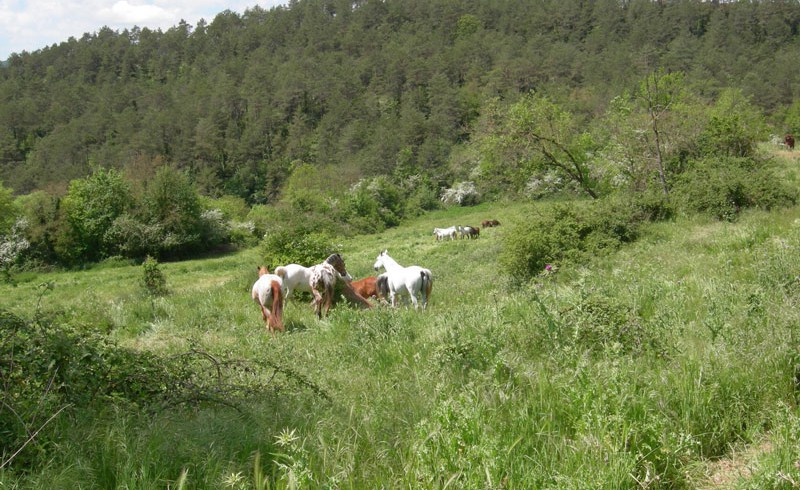
200 hectare for horses
This year Finca Mas Casanova (www.mascasanova.org) expanded by 140 hectares to 200 hectares of land with forests and mountain streams. The owner of Mas Casanova, Mercè Oms Molist, has been working on the enlargement for over three years. In 2017 she was finally able to sign the new leases, because old tenants had retired and she had done good groundwork. It has not always been easy, convincing long-established Catalan farmers to lease their land to a young woman with horses needs a lot of empathy, patience and steadiness. Since Mercè grew up in this area, she knew how to negotiate with the farmers.After the leases had been signed, forest had to be cleared, land cleared, fences pulled, water points checked, cleaned and possibly processed. So far, 20 hectares of land and forest have been cleared and over 15 km fences pulled, many in-house with the support of family and friends. The Epona Foundation helped with a donation to the financing of the fences.
ll this benefits our horses, who can change pastures and almost always have green fodder available. As 2017 was a very hot and dry year, we were especially happy about the new pastures. Most have natural waters of clear mountain streams or springs forming small lakes. In the woods there is protection from the sun and the heat. After a short time we could make out the paths that had pulled the horses criss-cross through the forest. Quickly they had become accustomed to their new areas and we had enjoyed watching them gallop and playfully galloping across the large, hilly areas. If the pastures are changed, there is always a strict ranking, our pony Toby must march with the draft horse “La Gorda” and the foal “Miel” in advance, then everything is ok, otherwise the chaos breaks out. Bravo Toby, that you care for order in the herd.
Cookie, Indu and Jumpy
Our pony cookie (see also the annual report 2012), which liked to graze alone, far away from the herd and often seemed to be untraceable, suddenly became sociable and the darling of the children. Since Martin, the son of Mercé and Xevier, goes to kindergarten, Mercé regularly organizes lessons in the pasture with the children. The children get to know nature and the horses, their behavior, their language, their habits. Cookie was on the spot right from the start, as soon as the kids came, they stroked and the little loner obviously enjoyed the company of little horse friends. We were amazed and pleased about this change, because he was now often seen with the other horses.
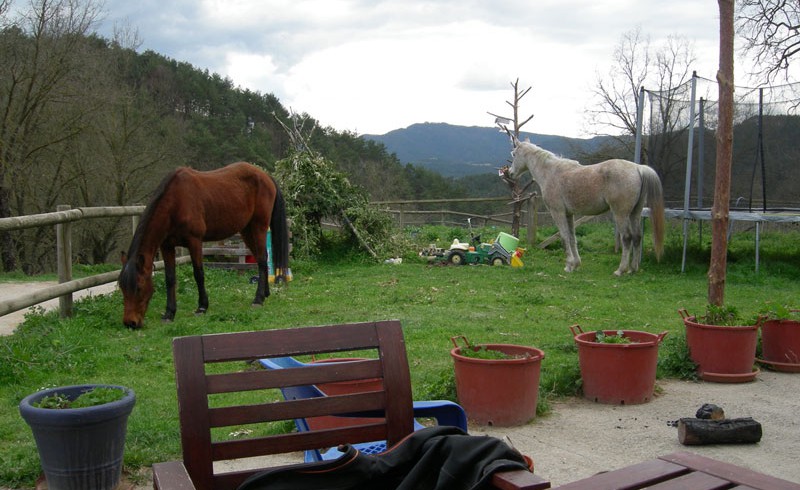
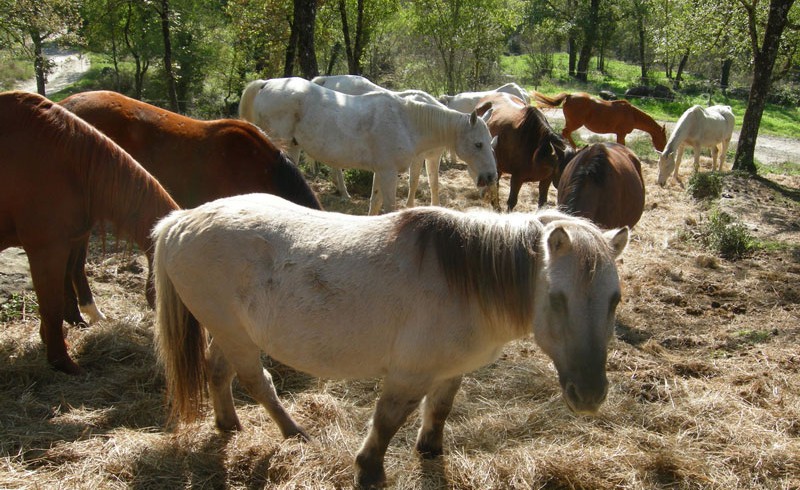
Indu had to pull a tooth again, because she can no longer eat hay, she is fed with soaked haycops as long as the grass grows sparsely in winter. And shortly after the procedure, she was allowed to be a lawn mower and eat the short, lush grass in the garden. Her best friend Luc was happy to help.
Jumpy made great strides this year with the help of the horse osteopath Silvia Marti Korff. He became much calmer and more relaxed and seems to enjoy brushing and grooming. Only the lifting of the hind hooves is not 100% perfect, but it gets better, which is due to the patience of our blacksmith Xesco.
At the end of the year Eva Reifler from Visionpure (www.visionpure.fr) visited the Epona Foundation. Eva reported on her new project in 2018: a fair on the topic of well-being with horses (www.salondubienetreaveclecheval.com). At this show, which will take place on an old racetrack near Paris, equitherapists, yoga instructors working with horses, coaches for couching, family celebrities, etc. will present their work. There are numerous events, lectures and demonstrations with horses. The star guest was Eva Linda Kohanov (www.eponaquest.com) from the USA. The author and horse trainer has been working in the field of horse-assisted therapy since the 1990’s, with leadership, assertiveness, personal development, relationships, intuition and emotional abilities.
Eva spontaneously invited the Epona Foundation to participate in the fair.

We quickly agreed that we would like to organize and lead a roundtable on “The well-being of horses” (Le bien être des chevaux). So far we have been able to get the veterinarian Dr. Anna Evans, best known for her ability to communicate with animals far beyond the borders of France, as well as the hoof trimmer Guillaume Parisot (www.podologie-equine-libre.net/tag/pel/) and the therapist Gautier-Jean Burgat, who works with disused racehorses (www.salondubienetreaveclecheval.com/programme-detaille/).
Annie Hansemanns reports from Brazil and Eritrea:
Godchildren and Uerê
Whereas overall Brazil is showing a slight improvement in the economy, Rio de Janeiro’s GDP is still going down. The downturn in oil prices, the huge investments for the sportive mega events, accompanied with a large scale corruption, made Rio de Janeiro insolvent. Public spending almost came to a standstill. Former governors and other public servants as well as managers of influential companies are being imprisoned or prosecuted for embezzlement of public funds and money laundry.
In 2017 Rio de Janeiro had a shortage of 2.200 teachers and particularly in the poor communities the shortage is acute. In some full day schools, children are being sent home at around 2 pm as there is no staff to attend. Teachers, who did not receive their salary in time or only in small installments, are resorting to alternative income opportunities. The conditions in the health care are similar. Staff often must wait for their salary, medical equipment is dysfunctional and many small health posts were forced to shut down due to lack of the most basic things like medicine or bandage. Access to procedures such as appointments to specialist doctors, exams and required surgeries became difficult for people from the poor communities.
The 2017 crime rate rose 7 % from 2016 and 26 % from 2015, whereby the shortage of
funding for public security is one of the main reasons. The criminal gangs took advantage of the situation and managed to regain control over their lost territories. Whereas in the past years the conditions for the population in the slums were slightly improving, the people now again are being taken hostage by the ruling drug factions as well as by often corrupt and repressive police forces. Armed disputes between rival gangs or clashes with police forces occur almost daily and violence is spreading into the city. An example is the huge and well-known slum Rocinha, located next to the upscale neighbourhood of Rio de Janeiro. After a few years of relative peace in this slum, a local drug lord was killed by rivals and since then the community is suffering from warlike conditions. Recently the president decided to give the soul decision-making power over public security in Rio de Janeiro into the hands of the armed forces, in an effort to interrupt the inflow of heavy weaponry and drugs into the slums.
The conditions in the slum Maré, where Projeto Uerê is located, became also complicated. Rival gangs resumed their armed battles for territory and military police forces conduct frequent raids in an effort to arrest suspects or in a search for weapons. As soon as shootings somewhere in the area take place, the public schools close down. Children in Maré lost many hours of school education.
Projeto Uerê always tries to keep their doors open – unless the shootings take place in front of their buildings. Children are regularly trained how to act in case of an emergency. The parents can get in touch with Projeto Uerê if they are in doubt whether the area is safe. Children arriving in the project are often tired and in shock of what they witnessed or experienced. It is more difficult to bring a smile to their faces. However, we cannot be more proud of them. They also show their resilience and willingness to get out of the mess one day. And we are proud of our teens who understood the value of education. Like Suellen, who, amongst other Uerês, completed her secondary education and who is preparing for the entrance tests in the university. These are true milestones and unheard of a few years ago, where the average school attendance was 6 years only. Like little Talita who lives in a very fragile family structure with a lot of difficulties to overcome.
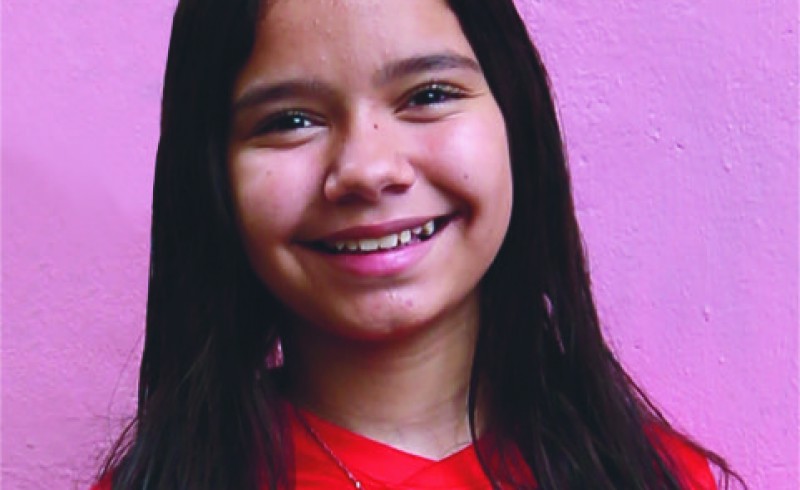
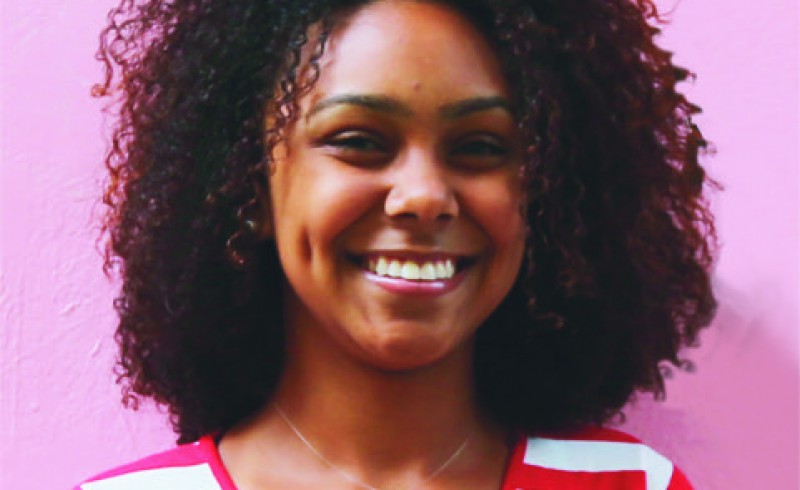
Other positives are the children of the violin group, whose performances become known in the city. The children eventually receive an invitation to Norway in 2018. The football team is going strong. The walls in the office of Projeto Uerê are stacked with trophies and one of the boys was discovered by a scout. The boy now trains with the Botafogo youth team and dreams of a football career.
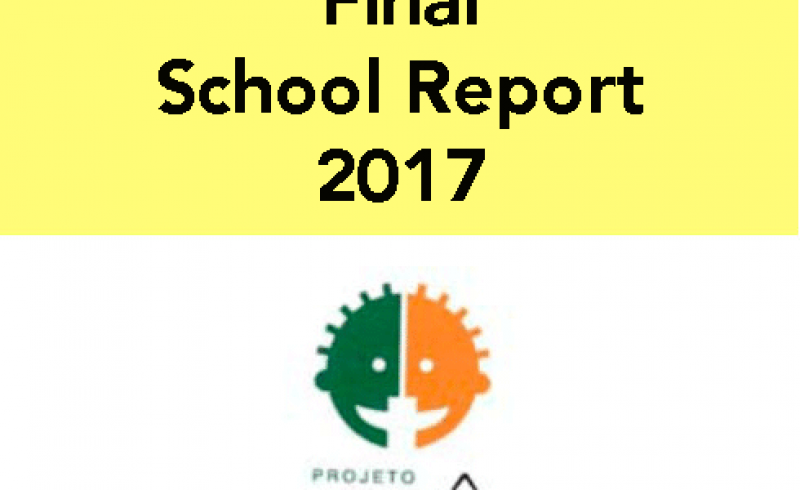
And last but not least, the teaching pedagogy in Projeto Uerê is being disseminated in projects and schools in other brasilian cities. Also schools in the hotspots of Nordrhein- Westfalen, in Sweden Poland and NGO’s in Greece are interested to learn more about the pedagogy to help staff in tackling the many difficulties of refugee or immigrant children. Therefore Yvonne de Mello is travelling a lot but she can do it as the staff in Projeto Uerê
Is well trained and motivated.
All this of course is only possible with the help of all our wonderful sponsors across the world and on behalf of our Uerê’s we thank each of you from the bottom of our heart and wish you a healthy and peaceful New Year.
Eritrea
In 2017 the rainy season unfortunately was one month short and in some areas there is hardly any vegetation. Farmers partly saw no alternative as to move with their cattle to somewhat more fertile regions with the result that overgrazing took place.
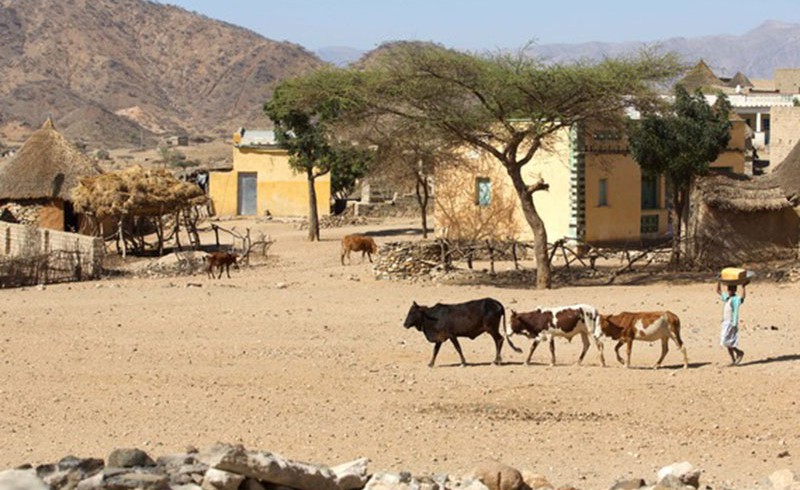
Whereas the government made enormous efforts to build water dams In many regions, the small water wells were dry and the villagers must walk 15 kilometres or more to reach a dam or another well to fetch water for their daily needs.
Whereas the men are serving in the army and boys look after the cattle and herds of goats, it is the task of the women and girls to fetch water and collect dry wood for the fire place.
It is very time consuming and hard work to walk in the heat and carry full water canisters to their homes. Apart from possible physical harm to their spines, the girls often are just too tired or too busy to regularly attend a school. Although primary education is mandatory, the school attendance in rural areas is often different – depending of the needs of the respective family.
A donkey to help carrying the heavy canisters makes all the difference. A donkey is resilient and frugal in grazing. A donkey can carry more than one canister of water per day and also carries wood or products to and from the nearby markets. An enormous relief for the mother who can focus more on growing some vegetables and enhancing the alimentation. Mothers, where the husband has died or disappeared, are being elected by local NGO’s (also the local nuns are doing amazing work) to receive a female donkey. The offspring helps to create a little wealth. The young donkey may be sold to buy chicken or goats. Again this contributes to the physical health of the children. The mother must promise not to sell her donkey (she never would) and to send her daughters to a nearby school.
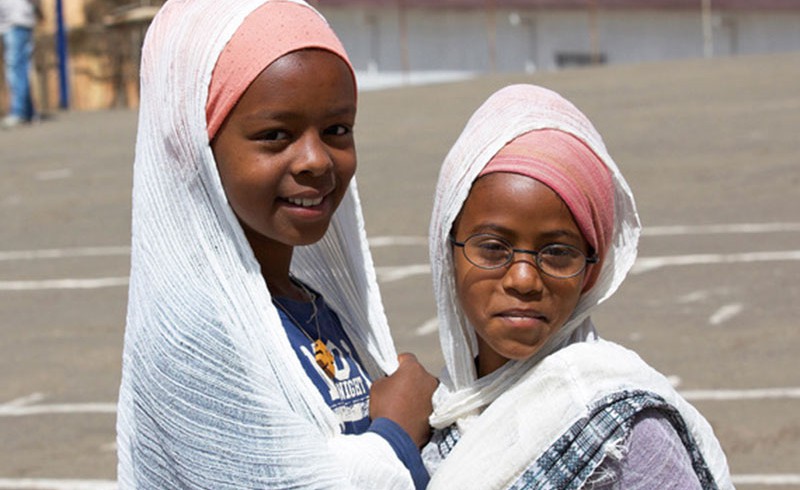
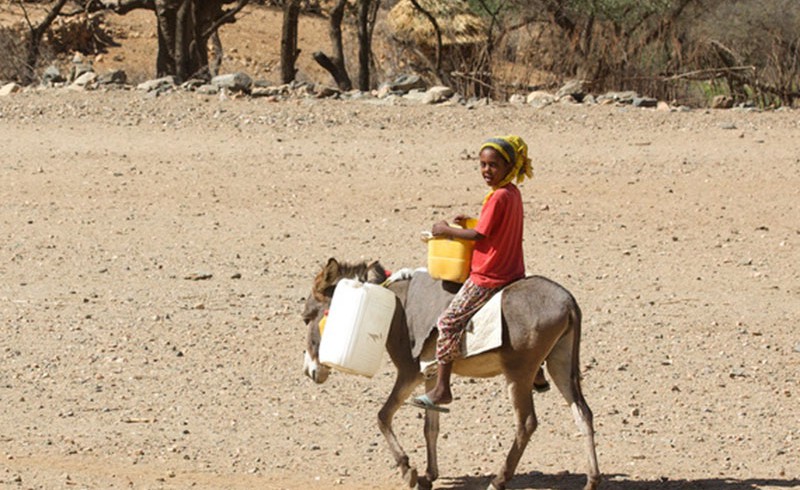
The only losses that may occur are occasional attacks of hyenas. ArcheMed is supporting a local NGO as well as catholic nuns of an Italian order to buy and distribute donkeys to needy families. A donation for a donkey is truly far reaching in a country like Eritrea. Many thanks to all the sponsors who help a mother help herself.